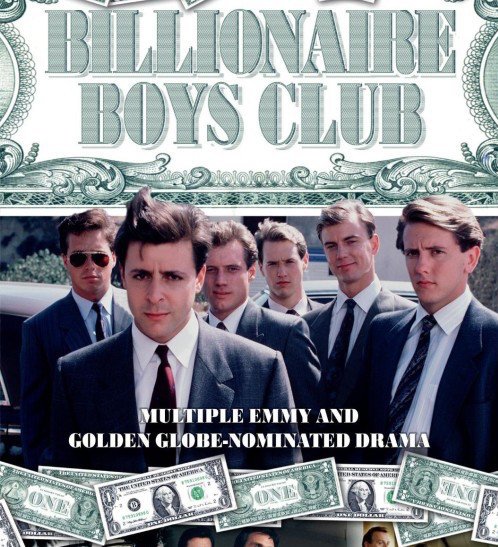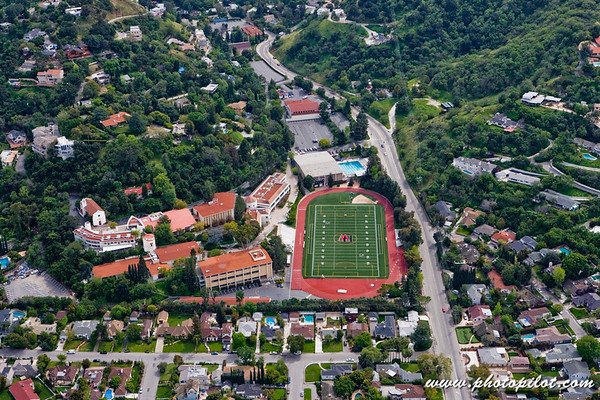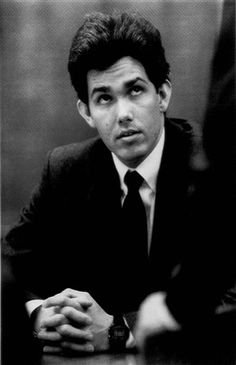My Introduction to High Stakes Finance and Investing - The Billionaire Boys Club

Harvard High
As I entered through the gates of Harvard High School (now Harvard-Westlake) for the first time, my eyes locked on the School's Coat of Arms emblazoned with a Griffin. I felt a sense of disbelief that this place would be my new school. Nestled in the hills of Studio City, just over the hill from Bel-Air, where many of the students lived, was one of Los Angeles' more illustrious private schools. The campus had its own Olympic sized swimming pool, an indoor Basketball Court with bleachers, a football field, an Art Studio, a Chapel, dorms, some of the best teachers, some of the brightest students and some of the wealthiest parents.

Aerial view of the campus
Source
Many of the students in the 9th grade already knew each other, since they had attended the Lower School (7th and 8th grade) for Harvard as well. I, on the other hand, did not know a soul. I made friends fairly quick, while also adjusting to both a long commute from East Los Angeles to Studio City by Public Transportation (the bus) as well as the new challenges of attending what felt like College. As I began to interact and make friends, I would occasionally hear some of the students talking about the "BBC." I didn't know what that was, but I soon learned that it was a financial investment club that was started by some Alumni Students of Harvard High School. The purpose of the club was for members to invest large amounts of money, and with their education and intelligence, would earn high returns and profits with smart investments in stocks and commodities. When I would over hear students speak about the "BBC" they mostly did so in hushed tones, and I wondered why.
"Joe Hunt" and the BBC

Joseph Henry Gamsky
aka Joe Hunt
Source: Pinterest
It was around November of 1986 that the story of the "Billionaire Boys Club" became news headlines. Some members of the Club were accused of extortion and murder for money and were now on trial. Several of those accused were Alumni students of Harvard High School, including the founder of the BBC, Joseph Henry Gamsky. Now I understood why students were not openly discussing the Billionaire Boys Club.
Joseph Henry Gamsky graduated from Harvard High School, and would later become known as Joe Hunt. Hunt moved with his father to Chicago and eventually found himself trading on the floor of the Chicago Mercantile Exchange. Initially Hunt did very well on the Chicago Exchange, even impressing some of the older traders, but eventually Joe Hunt lost investor money, and was banned from trading for 10 years for illegal practices.
Hunt would not be deterred, and returned to Los Angeles, California. Hunt and several other Harvard Alumni then started the BBC investment Club, named after the initials of a favorite hangout of Hunt's in Chicago called the Bombay Bicycle Club. Joe Hunt and some of the other members convinced many investors to deposit money with the BBC, with promises of large returns on their investments. Some of these investors were parents and families of the BBC founders themselves.
Hunt, as leader of the BBC, ran the group more like a fraternity, where he was not the President, but rather the Dictator of the group. His charismatic personality mesmerized many in the group, leading them to easily become his minions and to overlook his shady money management. He spent the investors' money living the "High Life" with no real returns to show, and the money ran out.
Enter the Conman
Joe Hunt had been using investor money to live and portray a lavish and successful lifestyle in order to impress and garner further investment money. The money kept flowing out, but it no longer was flowing in from gullible investors susceptible to Hunt's charm and charisma. It was time for Joe to step up his game or lose it all. Joe was now desperate, and met with a businessman known to be involved in shady money making schemes named Ron Levin.
Ron Levin was known in the underworld for running many types of businesses, many of them involved in cash only backdoor type dealings. Joe Hunt saw Ron Levin as a potential ally in his money making schemes and met with Levin in order to convince him to invest with him. Hunt, attempting to con a conman, explained to Ron Levin his ability to make money in commodities trading. Ron Levin then agreed to allow Hunt to make trades with another investor's account and money, valued at $5 Million Dollars, in return for a split of the profits.
Remarkably, Joe Hunt traded with that account, and turned it into about $13 Million Dollars worth. Hunt was now expecting a windfall of around $4 Million Dollars, and would now be able to pay back the initial investors in the BBC. Hunt was never able to get a hold of Ron Levin or his half of the profits from the trades. Joe Hunt swore revenge on Ron Levin, and according to court testimony and evidence found in Ron Levin's home, Hunt and several other members of the BBC kidnapped, extorted and murdered Ron Levin on June 6, 1984.
To Scheme Again
The BBC and its leader were not done yet. Ron Levin's body had been dumped and hidden, and would remain a case of a missing person. Ron Levin had many enemies and a criminal case pending, so it was easy to believe that Ron had left into hiding in order to avoid his problems. Joe Hunt and the BBC then turned to a recent and eager member of the BBC, Reza Eslaminia.
Reza wanted to fit in with the young and savvy group of men working for the BBC investment club. Reza volunteered his own father when he learned of the BBC's desperate financial situation. He stated that his father was worth $30 Million Dollars and they could kidnap and extort his father. Reza claimed that the kidnap and ransom suspicions would fall on Iranian terrorists, since his father was an enemy of the Ayatollah of Iran. Joe, desperate for money, and possibly eager to exert torture, agreed with Reza, and plotted the kidnapping of Hedayat Eslaminia. Unfortunately for Hedayat Eslaminia, he died during the kidnapping, and the BBC again failed to make any financial gains from their criminal exploits.
To Scheme No More
Joe and several members of the BBC were arrested late in 1984 for the murders of Ron Levin and Hedayat Eslaminia. One member of the BBC testified against Joe Hunt and the rest of the BBC members in exchange for immunity. Joe was able to represent himself against the murder charges for Hedayat Eslaminia, and eventually had that case dismissed. Hunt would not be able to avoid prosecution and conviction for the murder of Ron Levin. Joe Hunt had left a "Murder To Do list" at Ron Levin's home which matched his finger prints and his writing. Joe Hunt, founder of the Billionaire Boys Club Social Investment Club, remains in a California Prison serving a life sentence without parole.

Signature Logo Created by @czar
if you need one, he is steem dollars reasonable!
Full $teem Ahead!
My Top Blogs
-Intuos Drawing Tablet - A Product Review
-Dr. Senzör - The Evilution
Sources
Wall Street Journal
Los Angeles Times
Inmateaid.com
sfgate.com
Picture #1 : Wikimedia This is the Promotional picture for the NBC TV movie based on the BBC and Joe Hunt.
What a crazy story! Ponzi schemes never end well. I'm now following you and looking forward to hearing more
Believe it or not, I have quite a few more stories to tell, so stay tuned in.
full $teem ahead!
Merry Xmas @papa-pepper !
Hopefully 2017 is the year you get your own show on AMC or History or Discovery, I can just see it. It's coming.
Great article @streetstyle, this is some Wolf of Wall Street type shizz
Thanks @getonthetrain There are a lot more details that I didn't get into.... I won't ruin the movie coming up about the BBC.
full $teem ahead!